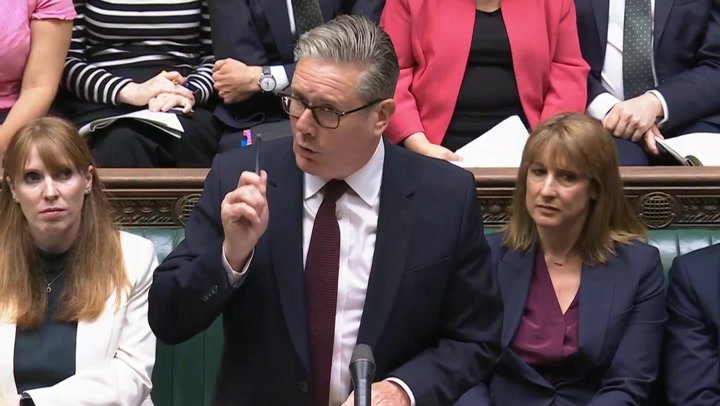Reform UK’s highly anticipated party conference has commenced in Birmingham, marking a pivotal moment for the party as it positions itself as a serious contender in British politics. Under the leadership of Nigel Farage, the party is unveiling an ambitious and controversial policy platform that promises to reshape Britain’s approach to immigration, taxation, and environmental policy.

Conference Sets the Stage for Government Ambitions
The Birmingham conference represents more than just a gathering of party faithful – it signals Reform UK’s preparation for potential governance. Former party chairman Zia Yusuf emphasized this strategic shift, stating that Nigel Farage is actively “preparing for government” and taking seriously the important work of getting ready to lead Britain.
This confidence comes as the party experiences a surge in polling numbers and welcomes high-profile defections, including former senior Conservative MP Nadine Dorries joining their ranks. The momentum suggests Reform UK is no longer content to remain on the political sidelines but is positioning itself as a viable alternative to traditional parties.
Immigration: The Centerpiece of Reform’s Vision
Mass Deportation Initiative
At the heart of Reform UK’s policy platform lies one of the most radical immigration proposals in recent British political history. The party has committed to removing 600,000 asylum seekers within their first term in office, addressing what Farage describes as “rising anger” among the British public regarding the small boats crisis.
This ambitious plan involves securing deportation agreements with countries including Afghanistan, Eritrea, and Iran – a strategy that has raised eyebrows among political observers. When questioned about potential financial arrangements with regimes like the Taliban, party officials described such deals as “quite reasonable” if they achieve the desired immigration outcomes.
UK Deportation Command
Reform UK plans to establish the “UK Deportation Command,” modeled after America’s controversial Immigration and Customs Enforcement (ICE) agency. This new enforcement body would spearhead the party’s aggressive approach to immigration control, representing what officials describe as “Trump mark two” for British politics.
The implementation of this policy would require Britain to withdraw from the European Convention on Human Rights (ECHR) and replace the existing Human Rights Act with a new British Bill of Rights. This constitutional overhaul demonstrates the party’s willingness to fundamentally alter Britain’s legal framework to achieve its immigration objectives.
Financial Implications and Criticism
Reform UK estimates their deportation plan would cost £10 billion to implement but claims it would save £7 billion currently spent on illegal migration during the first five years. However, independent analysis suggests the actual costs could be significantly higher, with deportation flights alone potentially costing £6.3 billion annually.
Critics have been swift to condemn the proposals. The Refugee Council accused the party of “fuelling fear and division,” while human rights lawyer Adam Wagner KC described the plans to leave the ECHR as “legally extreme.” These criticisms highlight the contentious nature of Reform’s immigration agenda.
Economic Revolution: Tax Cuts and Spending Pledges
Income Tax Transformation
Reform UK has pledged to dramatically reshape Britain’s tax landscape by increasing the personal allowance from £12,570 to £20,000. This policy would mean millions of workers would pay no income tax on earnings up to £20,000, representing one of the most generous tax breaks in recent British political history.
The Institute for Fiscal Studies estimates this policy alone would cost between £50 billion and £80 billion annually, raising serious questions about fiscal sustainability. Despite these concerns, Reform UK maintains that such tax cuts are essential for supporting working families and stimulating economic growth.
Inheritance Tax Abolition
The party has also committed to abolishing inheritance tax entirely, which currently affects estates worth over £325,000. With the Office for Budget Responsibility forecasting inheritance tax to raise £9.1 billion for the Treasury in 2025-2026, this represents another significant reduction in government revenue.
These tax policies reflect Reform UK’s broader philosophy of reducing the state’s role in the economy while maximizing individual economic freedom. However, critics question how these substantial tax cuts can be reconciled with the party’s spending commitments.
Environmental Policy: Scrapping Net Zero
Reform UK has committed to scrapping Britain’s net zero target within their first 100 days in power, representing one of the most dramatic environmental policy reversals proposed by any major political party. Farage claims the current net zero commitment costs the Treasury “an extraordinary £40 billion plus every year.”
The party argues that net zero policies are “deindustrializing Britain” and directly blames the decline of British manufacturing on environmental regulations. Farage has suggested this issue could become “the next Brexit,” indicating the party’s intention to make environmental policy a central dividing line in British politics.
Energy Secretary Ed Miliband has strongly criticized these proposals, describing Reform UK’s position as “nonsense and lies.” Government analysis suggests that abandoning net zero commitments would risk “climate breakdown” and forfeit opportunities in clean energy job creation.
The Office for Budget Responsibility’s 2021 analysis found that achieving net zero will cost £344 billion by 2050, spread over three decades and equating to approximately £11 billion annually. Importantly, the spending watchdog concluded that the costs of failing to control climate change would be “much larger” than the investment required for net zero.
Social Policy: Benefits and Welfare Reform
Two-Child Benefit Cap Reversal
Despite positioning itself as fiscally conservative, Reform UK has committed to ending the controversial two-child benefit cap. Farage emphasized this decision is “not because we support a benefits culture” but to provide essential support for low-income families struggling with the cost of living.
This policy reversal demonstrates the party’s complex relationship with welfare spending, supporting cuts in some areas while expanding support in others based on perceived public need and political advantage.
Winter Fuel Payments Restoration
Reform UK has pledged to reinstate winter fuel payments for all pensioners, reversing recent restrictions that limited the £200-£300 payment to only the poorest pensioners. This commitment appeals directly to older voters, a demographic that forms a significant portion of the party’s support base.
The party claims these social policies would be funded through savings from scrapping net zero initiatives, ending asylum seeker hotel accommodation, cutting equality initiatives in the public sector, and reducing the number of quasi-autonomous non-governmental organizations (quangos).
Political Strategy and Electoral Dynamics
Political analyst John Curtice has identified that “cultural issues have become much more central to electoral choice” in recent years, with Reform UK’s support being “above all defined by culture war issues.” The party’s focus on immigration, equality policies, and net zero reflects this strategic positioning.
The electoral mathematics reveal telling patterns: Reform UK enjoys 53% support among Brexit voters compared to just 11% among those who voted to remain in the EU. This stark divide indicates the party’s success in consolidating the cultural conservative vote that emerged during the Brexit referendum.
Challenges and Controversies
Financial Sustainability Questions
The most significant challenge facing Reform UK’s policy platform lies in basic arithmetic. The combination of massive tax cuts and increased spending commitments creates a substantial fiscal gap that the party’s proposed savings measures appear unlikely to fill.
Independent analysis consistently suggests that Reform UK’s revenue projections are overly optimistic, while their cost estimates may be significantly underestimated. This mathematical challenge could prove politically damaging if subjected to sustained scrutiny during an election campaign.
Legal and Constitutional Hurdles
Many of Reform UK’s key policies would require fundamental changes to Britain’s constitutional arrangements and international obligations. Withdrawing from the ECHR, replacing the Human Rights Act, and establishing new deportation mechanisms would face significant legal challenges and require complex legislative processes.
These constitutional changes would likely face resistance in Parliament, the courts, and from international partners, potentially making implementation far more difficult than the party suggests.
Looking Ahead: Reform UK’s Political Future
As the Birmingham conference concludes, Reform UK faces the challenge of translating conference rhetoric into electoral success. The party’s radical policy platform clearly differentiates it from both Conservative and Labour alternatives, potentially appealing to voters frustrated with mainstream political offerings.
However, the party must also address serious questions about policy feasibility, cost, and implementation. The gap between ambitious promises and practical governance could prove decisive in determining whether Reform UK can transition from protest movement to governing party.
The conference has certainly established Reform UK as a significant force in British politics, with policies that will likely influence the broader political debate regardless of the party’s electoral success. As Britain grapples with challenges around immigration, economic growth, and environmental policy, Reform UK’s radical alternatives ensure these debates will be more polarized and consequential than ever.
The coming months will reveal whether British voters are ready for the dramatic changes Reform UK proposes, or whether the party’s ambitious agenda proves too radical for mainstream acceptance. What remains clear is that British politics has been permanently altered by Reform UK’s emergence as a serious political force with detailed policy proposals and genuine governmental ambitions.




